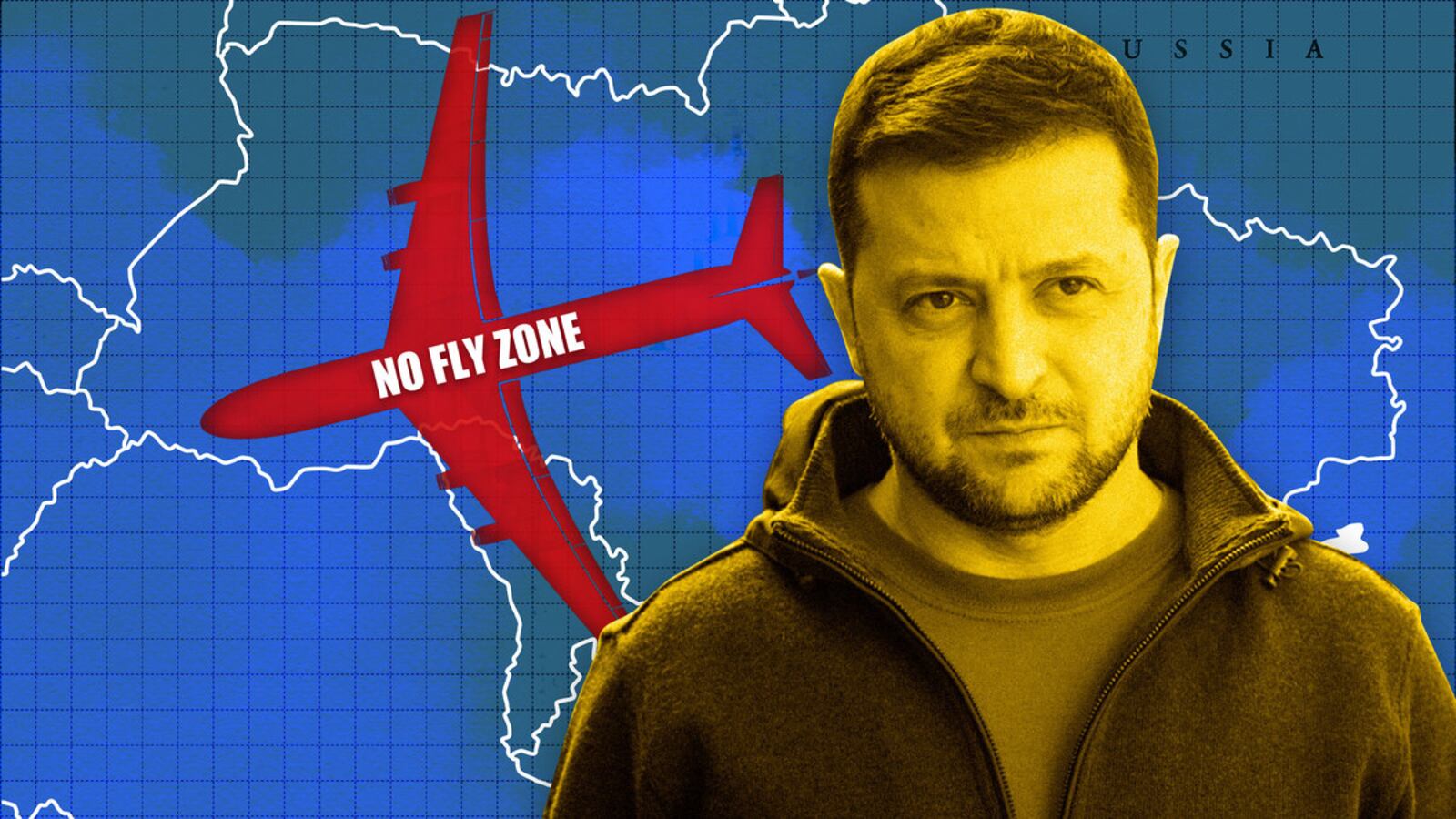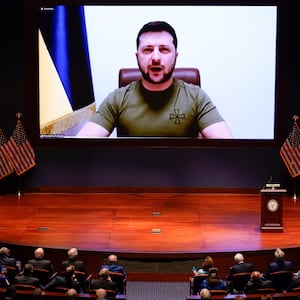At the start of Russia’s invasion of Ukraine, President Volodymyr Zelensky had a simple ask: Help me implement a no-fly zone over the Ukrainian skies.
But over the last week, Zelensky has softened on that call, potentially even backing off from it completely. When he met with NATO leaders and Group of Seven leaders last week, he made no mention of a no-fly zone.
It’s not that Zelensky wouldn’t take international help in enforcing a no-fly zone. Even as he’s stopped explicitly calling for one, top Ukrainian officials have not. Andriy Yermak, a top Zelensky adviser, called for a no-fly zone at an Atlantic Council event on Friday.
But Zelensky seems to understand that Ukrainian allies are unprepared to take that step—a step that could set off a literal chain reaction leading to nuclear annihilation.
And so, Zelensky has shifted his request to something more realistic: more military aid.
”I think he realizes that it’s not going to happen,” Ivo Daalder, the former U.S. ambassador to NATO, said of a no-fly zone. “Because it crosses a major threshold of direct military engagement between NATO and or the United States.”
There are plenty of good reasons Zelensky has backed off the request. For one, it was just unrealistic.
“After asking for it for so long, he recognized that it was just not going to be something NATO would agree to,” Steven Pifer, former U.S. ambassador to Ukraine, told The Daily Beast. “Because it would have required NATO to not only shoot down Russian planes but to conduct airstrikes against Russian air defense sites in Belarus or Russia proper.”
For another, a no-fly zone wouldn’t end Russian destruction in Ukraine.
“The damage being done is not from airplanes; it’s from missiles and artillery, which a no-fly zone would not affect,” Sen. Angus King (I-ME), a member of the Senate Armed Services Committee and the Senate Select Committee on Intelligence, told The Daily Beast. “So the benefit would be very limited.”
Still, lawmakers have no delusions that Zelensky wouldn’t want help establishing a no-fly zone.
“What I heard from Zelensky, and continue to hear from Zelensky, is to close the skies,” Rep. Tom Malinowski (D-NJ), who serves on the House Foreign Affairs Committee, told The Daily Beast. “What they've been consistent in asking for is that we help them close the skies.”
Indeed, the speaker of the parliament of Ukraine—as well as those in Estonia, Latvia, and Lithuania—called on the international community to establish a no-fly zone over Ukraine in a joint statement just last week.
The seemingly mismatched messaging from Zelensky and his inner circle could just be an indication that, while the Ukrainian president may be publicly shying away from the no-fly zone demands, he still wants the world to back him up.
“The fact that Yermak still mentions it tells me that they have not backed off,” John Herbst, former U.S. Ambassador to Ukraine, told The Daily Beast. “I think they still want it.”
Ukraine’s Embassy and Ministry of Defense did not return request for comment.
Zelensky may have been using the age-old tactic of “door-in-the-face”—asking for an extremely large or demanding concession, and knowing it might not be met, in order to then receive other, smaller but still valuable aid, such as military equipment.
“I’ve had a fair number of conversations where it was clear to me from things they said… that they would certainly prefer [a no-fly zone] but if they can't get that—and they're not certain they can—they take something less,” Herbst told The Daily Beast.
When Zelensky made his no-fly zone plea in a virtual address to Capitol Hill, he hinted he wasn’t so sure his request would be met with resounding success—so he built in a series of requests, each one perhaps more acceptable to the United States than a no-fly zone. Zelensky may just be hoping the Biden administration can provide the next-best thing.
“Is this a lot to ask for, to create a no-fly zone… over Ukraine to save people?” Zelensky asked members of Congress in a virtual address. “Is this too much to ask… something [so] Russia would not be able to terrorize our free cities?”
“If this is too much to ask, we offer an alternative,” Zelensky continued. ”Defense systems we need, S-300 and other similar systems,” he said, referring to anti-aircraft systems.
Sure enough, lawmakers have been pressuring Biden to transfer aircraft, through other countries, to Ukraine.
While those requests hang in the balance, there are still plenty of ways for the United States and other countries to support Ukraine.
Kyiv in recent days has sent lawmakers an updated list of military assistance it wants from the United States, including a request for 500 Stinger anti-aircraft missiles and 500 Javelin anti-tank missiles per day.
By providing the right defensive equipment, Ukraine could in essence create its own de facto no-fly zone, Wladimir Klitschko, a member of the Kyiv territorial defense and brother of Kyiv’s mayor, said Thursday.
“If you cannot help us to close the sky, we’re going to close the sky on our own,” Klitschko said on MSNBC. “We just need defensive weapons to do it.”









